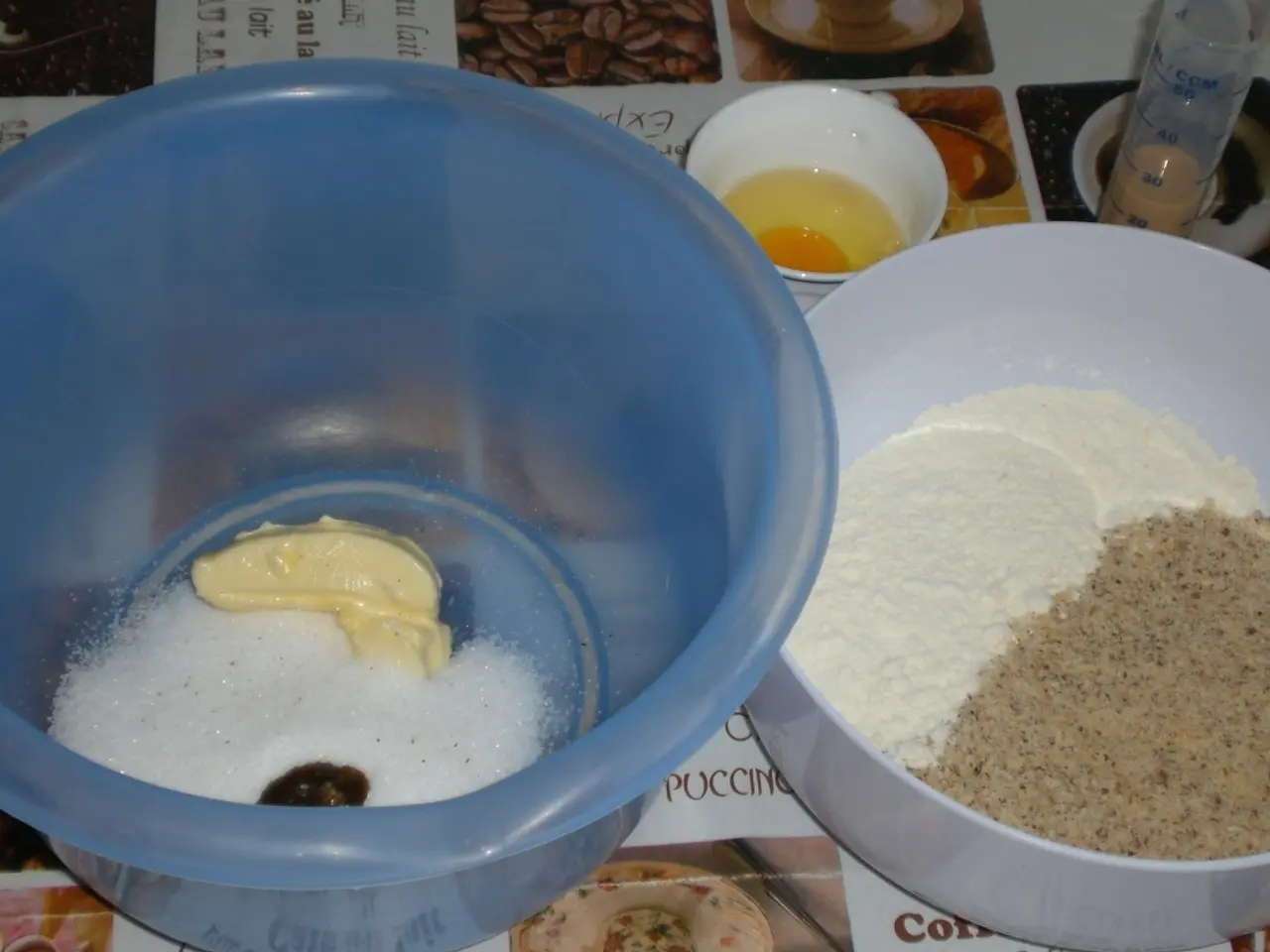Digestive system impacts and waste matter in cystic fibrosis explained
In individuals living with Cystic Fibrosis (CF), the disrupted digestive process can lead to a variety of challenges. One such challenge is the difficulty in absorbing nutrients due to thick mucus affecting the pancreas and intestines[1].
To combat this, a high-calorie, nutrient-dense diet is recommended. This diet consists of frequent small meals or snacks that are rich in protein, healthy fats, vitamins, and minerals[2]. Adding extra calories by incorporating oils, cheese, cream, and high-protein milk into foods can help increase intake without causing fullness too quickly[2]. Nutritional supplements and vitamins, especially fat-soluble ones, are commonly needed due to malabsorption[1][3].
Nutritional support programs, including financial assistance and clinical guidance, can help CF patients access the necessary supplements and balanced diets to maintain or gain weight, which improves overall health outcomes and reduces hospitalization risks[1].
For those with Cystic Fibrosis-related diabetes (CFRD), a specific form of diabetes that affects many CF patients, dietary adjustments are necessary. This includes managing blood glucose levels through increased fiber intake, reduced sugar consumption, and careful monitoring of carbohydrate intake alongside insulin therapy and exercise[4].
Recent approaches emphasize not just high calories but also improved diet quality, focusing on balanced nutrition to prevent chronic diseases as CF patients live longer[2][5]. This includes nutrient-rich snacks and hydration management, especially in challenging conditions like summer heat, to maintain electrolyte balance and steady blood sugars.
People with CF may also experience gastrointestinal symptoms such as abdominal pain, bloating, cramping, gas, nausea, loss of appetite, loose, greasy stools, constipation, and blockages[1]. To prevent the production of greasy stools, people with CF may need to start a treatment plan to improve digestion.
In severe cases, people with CF may develop distal intestinal obstruction syndrome (DIOS), a condition where a buildup of feces produces a mass that partially or completely blocks the intestine[1]. Symptoms of DIOS include severe abdominal pain, swollen stomach, and vomiting. In some cases, surgery may be necessary to remove the blockage.
Doctors may recommend dietary and lifestyle changes for people with CF, including avoiding smoking, exercising regularly, keeping hydrated, eating a nutritious diet, and taking fat-soluble vitamin supplements, zinc, and iron supplements[1].
In summary, a high-calorie, nutrient-dense diet with frequent small meals or snacks helps meet increased energy demands. The addition of oils, dairy, and supplements compensates for malabsorption and vitamin deficiencies. Nutritional support programs assist with access to adequate food and supplements. Management of CFRD through dietary control, insulin, and monitoring prevents malnutrition related to diabetes. Emphasis on diet quality and balanced nutrition improves long-term health outcomes for individuals with cystic fibrosis.
[1] Cystic Fibrosis Trust. (2021). Diet and Nutrition. https://www.cysticfibrosis.org.uk/living-with-cystic-fibrosis/diet-nutrition/ [2] Cystic Fibrosis Foundation. (2021). Nutrition. https://www.cff.org/Living-with-CF/Care-and-Treatment/Nutrition/ [3] National CF Society. (2021). Nutrition. https://www.cysticfibrosis.org/about-cf/nutrition/ [4] Cystic Fibrosis Foundation. (2021). Diabetes in Cystic Fibrosis. https://www.cff.org/Living-with-CF/Care-and-Treatment/Diabetes/ [5] Cystic Fibrosis Trust. (2021). Long-term Health and Wellbeing. https://www.cysticfibrosis.org.uk/living-with-cystic-fibrosis/long-term-health-and-wellbeing/
- For individuals with Cystic Fibrosis (CF), a high-calorie, nutrient-dense diet recommended for addressing nutrient absorption difficulties, consists of frequent small meals or snacks rich in protein, healthy fats, vitamins, and minerals.
- Malabsorption in CF patients often requires the use of nutritional supplements and vitamins, particularly fat-soluble ones, to compensate for nutritional deficiencies.
- Nutritional support programs, providing financial assistance and clinical guidance, are valuable in helping CF patients access essential supplements and maintain a balanced diet to support weight gain and improve overall health outcomes.
- Managing blood glucose levels through increased fiber intake, reduced sugar consumption, careful monitoring of carbohydrate intake, and insulin therapy is crucial for individuals with Cystic Fibrosis-related diabetes (CFRD), a common medical condition amongst CF patients.




